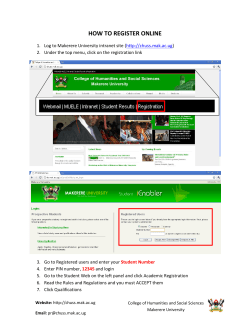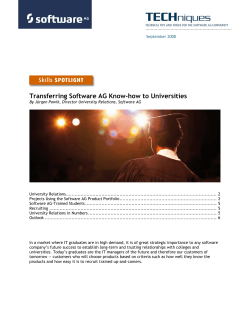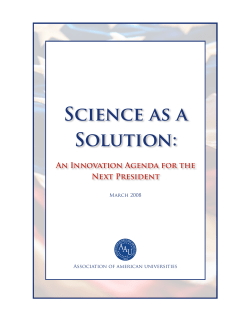
How to build sustainable partnerships Prof. Rhoda Birech
How to build sustainable partnerships - Practical experiences from AUSTRIAN funded projects Prof. Rhoda Birech OEAD - Alumni University-Industry Liaison Officer Egerton University 1 July 22, 2012 The APPEAR funded WATERCAP IS A PARTNERSHIP PLATFORM FOR ACTION IN WATER AND CLIMATE CHANGE • WATERCAP is a partner for research between Universities (PhD, MSc, MA and BSc) • WATERCAP is a partner for learning with communities • WATERCAP is a partner for policy participation at regional and national levels • WATERCAP has taught us practical steps in formation and execution of partnerships at different levels 2 3/12/2014 WATERCAP is “Strengthening Universities Capacities for Mitigating Climate Change Induced Water Vulnerabilities in East Africa-WATERCAP” by Ugandan, Kenyan and Austrian Universities Background to WATERCAP Start with the problem • Devastating impact of CC • Uncertain water supply for Agriculture • Universities decided to act Form the research team • RUFORUM (Regional Universities Forum for Capacity Building in Agriculture) bring 17 Univ. together • EU, MAK (East Africa) • BOKU 4 July 22, 2012 Seek support • APPEAR (Austrian Partnership Programme in Higher Education and Research for Development) • OeAD administered funds • Others Identify the beneficiary • Smallholder Farmers • Graduate Students • Other Stakeholders WATERCAP Operational Framework Obj. 1: Identification of internal and external constraints to effective partnerships Obj. 2: Form water innovation platforms for mutual learning on efficient use in small holder agriculture Obj. 3: Climate Change responsive curricula, training, research and outreach approaches Obj. 4&5: Sustainable partnerships for responding to and mitigating climate change Step 1: Understand your country’s development challenges • Understand development goals of your country • It can be agriculture, education, technology, ICT, health sector etc. • Know the critical problem in a sector within your discipline • Always propose home-grown solutions In the case of WATERCAP, the problem was Water vulnerability induced by Climate Change Step 2 - Identify a partner/ form a research team • Initiating partnership with individual researchers while in Austria • Know someone • Share your thoughts with your Professors • Starting from your supervisor • Initiating partnership with an institution • • • • Talk to the international-cooperation’ office of your University in Austria Seek the support of the linkages office in your home institution Let your supervisor help you Be aggressive – see and seize opportunities Paul (MAK) Michael (BOKU) Know someone Rhoda (EGERTON Washington (RUFORUM) Step 3 – Start with basics •Do consultations through meetings, email etc •Do agenda which should focus on the win – win for all partners •Develop trust •Share roles based on areas of strength and common interest of each partner •Identify a strong coordinator to do administrative work •In the case of WATERCAP, our team exchanged emails on possible proposals •We all met in Makerere one fine Saturday – each of us has been in Uganda for other missions •We identified RUFORUM as coordinator because of its influence in East and Southern Africa Step 4 - Develop cooperation instruments with: –Objective of the partnership –Benefits for each partners –Data management and information sharing I had helped Egerton renew its MoU with BOKU –Intellectual Property Rights (IPR) There was an existing MOU between EU and MAK EU was already part of RUFORUM –Supervision of students –Contribution from each partners –Institutions to be realistic in what they can contribute –Put mechanisms for streamlining communication –Incorporate aspects of institutional of penalties in case of poorperformance Do project specific agreements, each to make a –Have a reporting mechanism commitment and get support of your institution’s legal advisor –Activities, outputs and reports should be time bound Egerton – BOKU – UNESCO MoU (Support student exchange, joint degrees) Egerton – BOKU MoU (supports student and lecturer exchange) 10 July 22, 2012 Step 5 - Sourcing for funds •Be vigilant on the call for proposals by different donors •You can initiate a dialogue with a donor •Do internal sourcing for funds also •Show how to sustain the projects after the funding period ends •Be open to get extra support but inform your initial donor(s) •In the case of WATERCAP, APPEAR call was on partnership •The call came when academia has awakened to the need for partnership to address community problem •APPEAR call emphasized that we put country’s priorities first, which we did •We convinced our government to contribute to the budget – which it did Step 5 continued: Budgeting • Do reasonable budgets avoiding wastages, but should be motivating to workers •Uphold financial transparency (involve your Institutions Finance Department) • Put aside some money for coordination •In the case of WATERCAP, each of the partners institutions had a lead person and a trusted, hard-working project assistant •Graduate students are greatly helpful in doing some side jobs 12 July 22, 2012 Step 6: Write a good proposal •Jointly develop a strategy documents, master plans, strategic plans or proposals •Follow the donor interest but your country’s priority be clear •Be innovative – show from literature where the gaps are and why your idea is a good solution to the problem •Clearly link the topic - to the objectives – to the tasks (activities) – to time bound deliverables – show outcomes 13 July 22, 2012 Step 7 - Implementation plans and execution of common projects –Have a strong coordinator and involve dynamic research assistants –Always try to bring a student on board –Share activities depending on institutional advantages –Hold regular meetings or communication forums –Do regular reporting –Manage the finances well –Publish your work to make you to be known by the scientific world –close any source of weakness and misunderstanding In the case of WATERCAP, we specified the following: •How the students are hosted and supervised •Who pays for their field work •How to contribute to scientific publications •However, we had changelings in coordinating international meeting Step 8 - Sustainability •Draw a clear exit strategy •Create spin-off projects (new projects) •As you close up the project, strategically position yourself and sell-out your capacities to new partners WATERCAP has been a spring board to many initiatives: At the community At the region GROW WITH YOUR PARTNER THANK YOU
© Copyright 2025





















